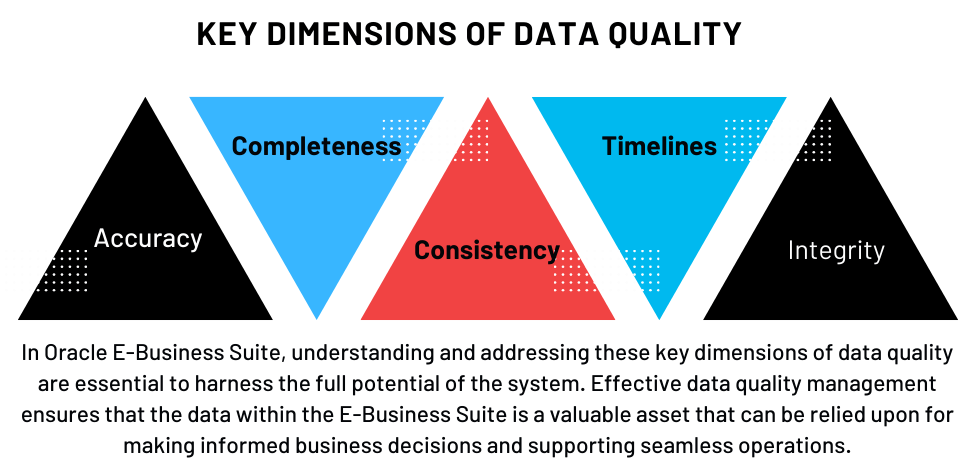As the modern business landscape evolves towards a more data-driven landscape, ensuring data quality within Oracle database testing E-Business Suite (EBS) is paramount. As organizations increasingly rely on EBS to manage critical aspects of their operations, the accuracy, integrity, and reliability of data becomes the cornerstone of decision-making and efficiency. Yet, maintaining data quality is a multifaceted challenge, encompassing data validation, migration, integration, and ongoing data management.
In this blog, we dive to uncover the best practices for testing that can safeguard and enhance data quality within Oracle database testing EBS, empowering organizations to not only optimize their processes but also make informed decisions that drive business growth and success.
Common Data-Related Challenges in Oracle E-Business Suite
Data-related challenges in the Oracle E-Business Suite include:
- Data inconsistency, where the same data is stored in multiple places, leading to discrepancies and confusion. Data entry errors can proliferate throughout the system if not caught early.
- Data duplication, resulting in redundant records that can clutter the system and impact performance. Incomplete or missing data can hinder processes, while outdated data can lead to inaccurate reporting.
- Ensuring data security and compliance with data privacy regulations is an ongoing challenge.
All these challenges collectively highlight the critical need for proactive data quality measures.
The Role of Oracle Database Testing in Ensuring Data Quality
Testing plays a pivotal role in maintaining data quality within Oracle E-Business Suite.
- It serves as a proactive mechanism for identifying and rectifying data-related issues.
- It validates data accuracy, consistency, and completeness across various modules and processes.
- It helps uncover data entry errors, missing data, and duplications.
- Regression testing ensures that data remains intact as system changes and updates occur, preventing unexpected data corruption.
- Testing is indispensable for ensuring compliance with data privacy regulations, safeguarding sensitive information.
Effective Oracle database testing practices not only bolster data quality but also boost confidence in the system’s reliability, supporting better decision-making and ultimately contributing to the success of an organization’s Oracle E-Business Suite implementation.

Best Practices for Oracle Database Quality Testing
A. Test Data Preparation:
- Generating Realistic and Representative Test Data: Effective testing quality begins with realistic and representative test data. Generate data that accurately mirrors real-world scenarios to ensure comprehensive testing of all possible scenarios.
- Ensuring Data Privacy and Compliance: While generating test data, prioritize data privacy and compliance. Anonymize or mask sensitive information to protect privacy and adhere to relevant data protection regulations like GDPR or HIPAA.
B. Test Environment Setup:
- Creating Environments that Mirror Production Data: The test environment should closely replicate the production environment, including data structures and configurations. This ensures that test results accurately predict how the system will behave in real-world conditions.
- Isolating Test Environments to Prevent Data Contamination: Isolation of test environments is crucial to prevent data contamination. Ensure that Oracle database testing does not inadvertently affect the production system. Isolation safeguards data integrity and reduces the risk of costly mistakes.
C. Test Automation:
- Automating Data Quality Checks and Validations: Automate quality checks and validations to streamline the testing process. Automation ensures consistency and repeatability, allowing for thorough and efficient testing of large datasets.
- Creating Reusable Data Testing Scripts: Develop reusable data testing scripts and tools that can be applied across different projects and testing phases. This promotes efficiency and consistency in data quality testing efforts.
D. Continuous Monitoring:
- Implementing Data Monitoring Solutions: Implement data monitoring solutions that continuously assess data quality. These solutions can automatically detect anomalies and deviations from established data quality standards.
- Setting Up Alerts for Data Quality Issues: Configure alert mechanisms to promptly notify relevant stakeholders when data quality issues are identified. Quick response to alerts allows for immediate action to rectify data quality problems before they escalate.
By adhering to these best practices, organizations can establish a robust Oracle database testing quality framework within Oracle E-Business Suite, ensuring that data remains accurate, reliable, and compliant throughout its lifecycle. These practices not only enhance data quality but also contribute to the overall success and efficiency of Oracle E-Business Suite implementations.
Data Quality Testing Process
A. Planning Data Quality Tests:
Identifying Critical Data Elements:
- In the planning phase, it’s essential to identify the critical data elements within Oracle E-Business Suite that require testing. These are the data fields or entities that significantly impact business processes, decision-making, or compliance.
Defining Data Quality Metrics and Thresholds:
- Define specific data quality metrics and acceptable thresholds for each critical data element. These metrics could include accuracy, completeness, consistency, timeliness, and integrity. Establishing clear thresholds helps determine when data quality falls below acceptable levels.
B. Executing Oracle Database Testing Quality:
Running Data Tests within Test Cycles:
- During the execution phase, data quality tests are executed as part of test cycles within the Oracle E-Business Suite environment. These tests may include data validation checks, data profiling, and performance testing to ensure data quality across various modules.
Recording and Analyzing Test Results:
- Test results should be meticulously recorded and analyzed. This involves comparing actual data outcomes against the predefined data quality metrics and thresholds. Any deviations or issues should be documented for further investigation.
C. Data Quality Issue Resolution:
Identifying and Documenting Data Quality Issues:
- Data quality issues identified during testing must be documented in detail. This documentation should include the nature of the issue, its impact on business processes, and its root cause. Accurate documentation is essential for effective resolution.
Collaborating with Data Stakeholders for Resolution:
- Testing quality issues often require collaboration between various stakeholders, including data analysts, database administrators, and business users. Effective communication and coordination are key to resolving these issues promptly. Solutions may involve data cleansing, process adjustments, or system enhancements.
The oracle database testing quality testing process in Oracle E-Business Suite is a systematic approach that ensures critical data elements meet predefined quality standards. By meticulously planning, executing, and resolving data quality issues, organizations can maintain high-quality data within their E-Business Suite environment, ultimately contributing to informed decision-making and efficient business operations.
Safeguarding data quality in Oracle E-Business Suite through effective testing practices is an essential pillar of modern business operations. By implementing best practices for Oracle database testing validation, migration, integration, and continuous monitoring, organizations can establish a robust data quality framework that not only enhances the reliability of their Oracle EBS but also strengthens their decision-making capabilities.


